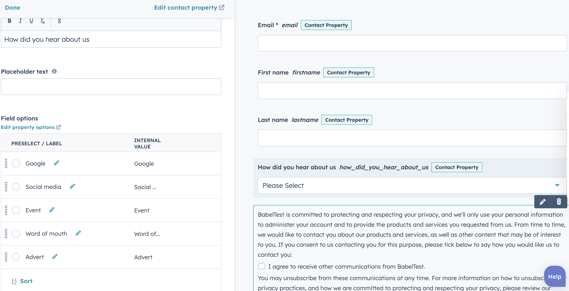HubSpot Marketing: How to use self-reported attribution in your forms
Gain straightforward insights into which marketing channels are most effective for your business.
Have you ever wondered how a prospect discovered a great piece of material on your website? Perhaps you've used the 'Original source' field in HubSpot, or maybe used tracking links. These are valid ways of tracing how your contacts found you. But, another very effective (and sometimes more useful) way to collect attribution is to ask them, which is also known as self-reported attribution.
By incorporating this small-but-powerful tool into your HubSpot forms, you can gather critical data about the effectiveness of your marketing efforts and website content. With this information in hand, you'll be able to make informed decisions about your best-performing marketing channels.
So what is it and why is it important?
Self-reported attribution is a low-effort but high-impact marketing measurement that asks the visitor how they heard about you via a form on your website.
This then provides you with an insight into what marketing efforts are working. Did the visitor find you on Google, social media, or at an exhibition? As a business, it’s important to know those touch points and what marketing efforts are driving conversions.
Let’s take a look at how you can add self-reported attribution to your Hubspot forms
Step 1
Select the form you want to use.

Step 2
Create a new property within the form as a drop-down option with yous self-reported attribution categories, these include some of the most common answers.
I recommend always using a drop down box with pre-filled options over a free-text field as this makes it easy for reporting data. This box should also be a mandatory field.

Although self-reported attribution can be extremely beneficial, like most things there are also limitations and it is important to take these into consideration when using it in your forms.
People only tend to remember their most recent interaction with your company so although they might have visited your website two months ago from a Google search, they would more than likely fill this question out from their latest touchpoint which will miss the detail of their first interaction.
Furthermore, you won't get really granular detail from self-reported attribution. For example, they might answer at an event or social media. This will then not provide you with the level of detail you are looking for to associate it with your specific marketing campaign. What event and what social media platform or advert did they click?
Despite this self-reported attribution provides great high-level insight and makes it really easy to see, at a glance, what your best performing marketing channels are.
Author: Mel Baker
Inbound Marketer


